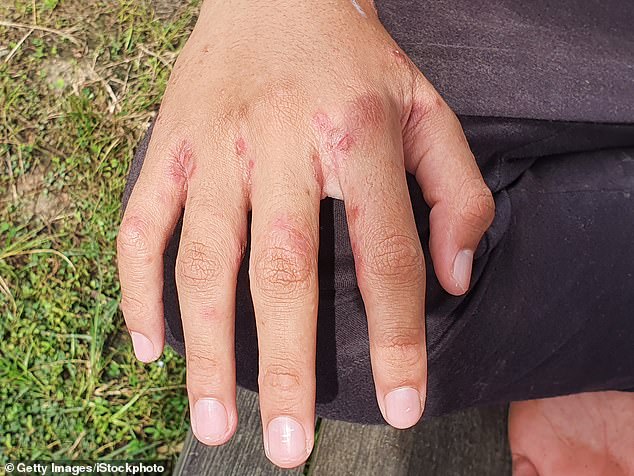Cases of highly contagious skin bug scabies are increasing across the UK, with cases occurring ‘out of the blue’ and entire households affected.
The condition, caused by microscopic mites that burrow into the skin, causes intense itching and spreads easily if people are in close contact.
If not treated properly, the infestation can persist for months or even years, while the parasite and its eggs can also live in sheets and towels.
Health officials are now warning the public to watch for symptoms.
Professor Kamila Hawthorne, president of the Royal College of GPs, said: “If not treated properly, scabies can spread rapidly and increase the patient’s risk of complications, such as secondary skin infections, or worsen existing skin conditions.”
The condition, caused by microscopic mites that burrow into the skin, causes intense itching and spreads easily if people are in close contact.

Health officials warn the public to watch for the symptoms of scabies, which can appear as a red, raised rash between the fingers.
Diagnosing scabies can be a challenge, as it can take up to eight weeks for the telltale red rash to appear, affecting the folds of skin inside the elbow, knee, buttocks, and between the fingers and toes.
In its early stages, the only symptom may be intense itching, which worsens at night.
Later, raised red “trails” or spots will be seen, where the mites tunnel to lay eggs.
Some 3,689 cases were diagnosed in hospitals in England in the year to April, up from 2,128 the previous year, according to NHS figures reported by the bbc.
Depending on how the virus is transmitted, outbreaks are most common among schoolchildren, young adults (who can contract it through sexual transmission), and in nursing homes.
People with weaker immune systems may be vulnerable to a more severe form of the disease, crusted scabies, which involves a higher density of mites.
Scratching can also exacerbate other skin conditions such as eczema or psoriasis and can lead to complications such as bacterial infections.
However, it is a myth that scabies is linked to poor hygiene – washing regularly makes no difference and anyone can be affected.
Professor Kamila Hawthorne, president of the Royal College of GPs, said: “Although not a serious condition, scabies can be very itchy and irritating, and can be easily contracted through close physical contact.”

Depending on how the virus is transmitted, outbreaks are most common among schoolchildren, young adults (who can contract it through sexual transmission), and in nursing homes.
He confirmed that doctors were seeing an increase in cases with the majority of cases occurring in the north of England, and urged people to seek medical help if they suspect they are infected.
‘Patients may be afraid to seek treatment given the social stigma surrounding this condition, but it is important that they do not ignore their symptoms.
“Doing so risks spreading the disease to other people, especially if they live near other people, such as on a college campus.”
The BBC has heard from people at five universities across the country talking about multiple cases that emerged “out of the blue”.
One student said he noticed “little red dots” along his wrist that began to spread.
‘One of my housemates said she also had scabies at the time. “So I thought, ‘Okay, me too,'” he added.
Another student reported that he had been trying, unsuccessfully, to get rid of the infection for “two or three months.”
Treating scabies involves rubbing an antiparasitic lotion (permethrin or malathion) into the skin all over the body, including under the nails, and keeping it on for at least eight to 12 hours.
This means reapplying it every time a person washes their hands. The process should be repeated seven days later to ensure that all mites and their eggs have been destroyed.
Everyone living in the same household and any sexual partners in the last eight weeks should also apply it, even if they do not have symptoms.
As MailOnline previously reported, previous outbreaks have led to shortages of permethrin.
Doctors can now also prescribe ivermectin, which comes in pill form, as an alternative.
Professor Hawthorne said: “If symptoms persist after treatment, the patient should contact their GP.”
“We are aware that symptoms can affect a patient’s quality of life, so we will do everything we can to ensure the individual receives prompt and effective treatment.”


